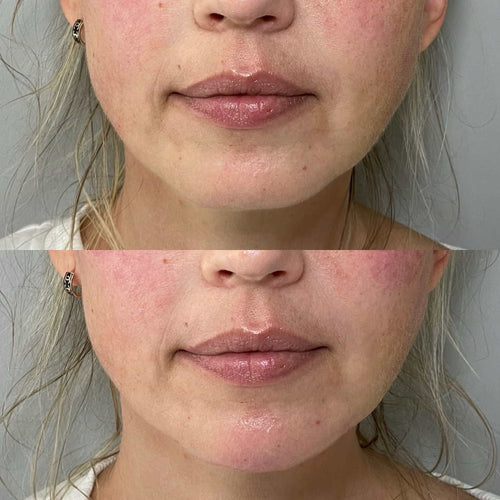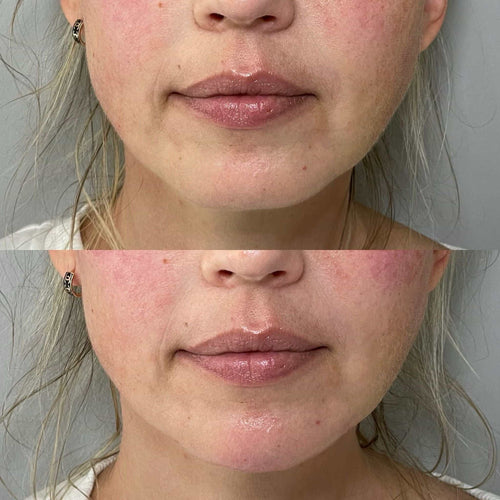Book a Dermal Filler Session with Dr. Laura Geige Now
Expected Timeline
Mild to Moderate Swelling
The duration for lip swelling to subside after filler treatment generally varies depending on several factors, including the amount of filler injected, the type of filler used, individual healing rates, and any potential complications.
Typically, mild to moderate swelling is expected in the first 24-72 hours following the procedure. During this initial phase, the lips may appear puffy, tender, and slightly bruised.
Within the first week, most individuals experience a significant reduction in swelling. By day five or six, the majority of the initial puffiness should have subsided, leaving behind subtle residual swelling.
Full resolution of swelling usually occurs within 1-2 weeks. However, some individuals may take slightly longer for the inflammation to completely disappear.
It is important to note that factors such as massaging the lips gently, applying cold compresses, and elevating the head while sleeping can help minimize swelling and promote faster healing.
Significant Swelling
Expected timeline for lip swelling after filler injections varies greatly depending on several factors, including:
1. **Amount and type of filler used:** Larger volumes and certain fillers like hyaluronic acid may cause more noticeable swelling.
2. **Individual’s body response to the filler:** Some people naturally experience more inflammation than others.
3. **Injection technique:** Precise injections can minimize trauma and reduce swelling.
4. Location of injection: Injecting deeper layers may lead to longer-lasting swelling.
Here’s a general guideline:
– Immediate swelling is common and typically peaks within 24-72 hours after treatment.
– Most noticeable swelling usually subsides within 1-2 weeks, though some residual puffiness may persist for several weeks.
– Significant swelling that extends beyond two weeks or causes discomfort should be reported to your injector as it could indicate a complication requiring attention.

Tips to Minimize Swelling:
– Apply cold compresses frequently in the first 24-48 hours after treatment.
– Avoid strenuous activity, alcohol consumption, and smoking immediately following injections.
– Follow your injector’s post-treatment instructions carefully.
– Elevate your head while sleeping.
Factors Affecting Swelling Duration
Type of Filler Used

Several factors influence how long swelling persists after lip filler injections.
One primary factor is the amount of product injected.
Larger volumes generally lead to more pronounced and longer-lasting swelling.
Conversely, smaller injections typically result in milder and shorter-lived edema.
The individual’s natural healing response also plays a significant role.
Some people naturally experience faster resolution of inflammation compared to others.
Preexisting medical conditions, such as allergies or autoimmune disorders, can potentially prolong swelling duration.
It’s also crucial to consider the type of filler used.
Hyaluronic acid fillers, a common choice for lip augmentation, tend to cause less and shorter-lived swelling compared to collagen-based fillers.
Furthermore, certain hyaluronic acid formulations are specifically designed to minimize post-injection swelling.
Lifestyle factors like smoking, alcohol consumption, and sun exposure can impact healing and potentially exacerbate or prolong swelling.
Following the provider’s aftercare instructions meticulously is essential for optimal results and minimizing swelling duration.
This includes avoiding strenuous activity, excessive heat, and facial massage in the initial days post-treatment.
Individual Variation
Swelling after lip fillers is a common and typically temporary side effect. However, the duration of swelling can vary significantly from person to person.
Here are some factors that can affect how long it takes for lip swelling to subside:
- Amount of filler injected: Larger volumes of filler generally lead to more pronounced and longer-lasting swelling.
- Type of filler used: Different fillers are composed of various substances, some of which may cause more or less inflammation than others. Hyaluronic acid fillers, for example, tend to have shorter-duration swelling compared to collagen-based fillers.
- Technique used by the injector: An experienced injector who uses precise techniques can minimize trauma to tissues and reduce swelling potential.
- Individual factors:
- Metabolism:** Some individuals naturally process substances faster than others, leading to quicker resolution of swelling.
- Body chemistry:**
- Those with sensitive skin or a predisposition to allergies might experience more prolonged swelling.
- Lifestyle factors: Smoking, alcohol consumption, and lack of sleep can impede healing and prolong swelling.
- Sun exposure:** UV rays can irritate the skin and exacerbate swelling. It’s important to protect your lips from the sun after filler injections.
Schedule Your Dermal Filler Appointment at It’s Me and You Clinic with Dr. Laura Geige
Typically, initial swelling peaks within 24-48 hours after lip filler treatment. Moderate swelling usually subsides within a week, but some degree of puffiness may persist for up to two weeks. It’s important to follow your injector’s post-procedure instructions carefully to optimize healing and minimize complications.
If you experience excessive swelling or any other unusual symptoms after lip fillers, consult your doctor immediately.
Injection Technique Reducing Lip Swelling
Several factors influence the duration of swelling after lip filler injections.
**Injection Technique** plays a crucial role in minimizing swelling. A skilled injector will use precise techniques to deposit the filler evenly and avoid excessive trauma to the delicate tissues. Techniques like **micro-cannula injection** are particularly beneficial as they create less bruising and swelling compared to traditional needles.
The type of **filler used** also impacts swelling. Hyaluronic acid fillers, which are readily absorbed by the body, typically cause less pronounced and shorter-lasting swelling than permanent fillers.
**Individual factors**, such as skin thickness, metabolism, and overall health, can also affect swelling duration. People with thinner skin or faster metabolisms may experience quicker resolution of swelling.
Other contributing factors include the **amount of filler injected**. Larger volumes naturally lead to greater swelling.
**Post-injection care** is essential for reducing swelling and promoting optimal healing. Applying cold compresses, avoiding excessive sun exposure, and refraining from strenuous activity can significantly shorten swelling time.
Ice Packs and Cold Compresses
Arrange a Consultation for Dermal Fillers with Dr. Laura Geige Today
Several factors influence how long swelling lasts after filler injections, including the type and amount of filler used, individual healing rates, and the specific injection site.
Generally, mild swelling around the lips can subside within a few days to a week. However, more substantial swelling might take up to two weeks or even longer to fully resolve.
Ice packs and cold compresses are commonly recommended to minimize swelling after filler procedures.
Applying ice for 15-20 minutes at a time, several times a day, can help constrict blood vessels in the treated area, reducing inflammation and fluid buildup.
Remember to wrap the ice pack in a thin towel or cloth to avoid direct contact with the skin, as this can cause further irritation.
Following your injector’s specific post-treatment instructions carefully is crucial for optimizing healing and minimizing complications. They may recommend additional strategies, such as elevating your head while sleeping or avoiding strenuous activity.
Over-the-Counter Medications
Swelling duration following dermal filler injections can vary significantly depending on several factors.
**Individual Variation:** Every person’s body reacts differently to foreign substances like fillers. Some individuals may experience minimal swelling that subsides quickly, while others may have more pronounced swelling that takes longer to resolve.
**Injection Technique:** The depth and location of injections can influence swelling. Deeper injections or injections into areas with thinner skin might result in longer-lasting swelling compared to superficial injections.
**Type and Volume of Filler:** Certain types of fillers are more likely to cause swelling than others. Hyaluronic acid fillers, for example, tend to be less associated with significant swelling compared to some other filler materials. The volume injected also plays a role; larger volumes generally lead to more swelling.
**Body’s Response:** Inflammation is a natural part of the healing process. Your body’s individual inflammatory response will determine how quickly the swelling subsides.
**Lifestyle Factors:** Smoking, alcohol consumption, and certain medications can all affect your body’s healing process and potentially prolong swelling.
Over-the-counter (OTC) medications can help manage swelling after filler injections. However, it’s crucial to consult with your injector or a medical professional before taking any medications.
**Nonsteroidal Anti-Inflammatory Drugs (NSAIDs):** Medications like ibuprofen or naproxen can reduce inflammation and alleviate swelling. These are often recommended for mild to moderate swelling. It is important to follow the dosage instructions carefully and be aware of potential side effects such as stomach upset.
**Arnica:** Arnica gel or tablets are a popular home remedy for reducing bruising and swelling. While research on its effectiveness for filler-related swelling is limited, many people find it helpful.
Josie Barrett Dr. Nerina Muses James Martin Live Lottie London Aesthetics
- Retinol Peel For Oily Skin In Kingston Upon Thames - May 31, 2025
- Profhilo Treatment Near Esher, Surrey - May 30, 2025
- Redensity 1 Skin Booster Treatments Near Tatsfield, Surrey - May 30, 2025
